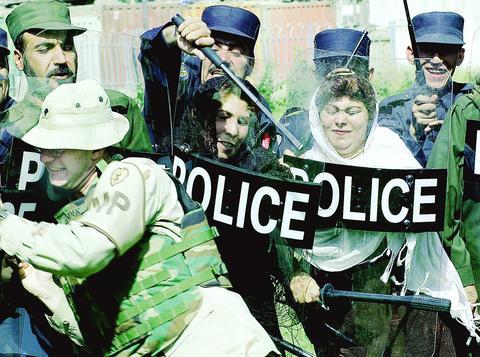The burly nomad with a henna beard and a fierce scowl grips the pen between his thick fingers. Turgul cannot read the election material around him, but is determined to practice the first vote of his life.
The turbaned tribesman drags the pen across a scrap of paper. "Just like that," he says uncertainly, holding aloft the squiggle that will mark his choice.

PHOTO: AFP
Few elections have faced such a dizzy array of challenges as Saturday's presidential poll in Afghanistan. Taliban terrorists are threatening bombings and warlords may try to warp the result. The terrain is forbidding, the logistics maddening and, like Turgul, many voters are illiterate.
"It's been very difficult," said Amandine Roche, a UN civil education officer. "But Afghans really want this to work."
More than 10 million voters have registered, 40 percent of them women; there is an ethnically diverse field of 18 candidates; and for the first time ever, war-worn Afghans will taste democracy.
There is also anxiety. In the south and south-east, the Taliban have threatened to scuttle the poll through violence and intimidation. Afghan and coalition forces on Saturday arrested 25 Taliban suspects in a dawn raid in Kabul.
Away from the capital, the main worry is the warlords who, between them, have 45,000 gunmen in their pay. Flush with soaring drug revenues, many vow to retain influence over their fiefdoms.
"Many rural voters say the militias have told them how to vote, and they're afraid of disobeying," said Brad Adams of Human Rights Watch.
The UN, which is spending US$200 million on the election, has 115,000 election officials and has hired 5,000 satellite phones, 1,150 jeeps, four helicopters and a cargo jet. The final vote will not be tallied until the last ballot box returns from the farthest reaches of the Hindu Kush mountains by donkey, up to two weeks after polling day.
Yet Afghans display an infectious enthusiasm about the poll. Yesterday Kuchi nomads gathered outside their tents on a hillside near Kabul for a lesson in voting.
Shah Faqir, a one-eyed sheep farmer, was unable to read but could point to the photograph of his chosen candidate, Hamid Karzai, the country's interim leader. "He stopped the fighting and brought stability to this country," he said. "The others are bad guys. If they win, the gunmen will return and the country will be destroyed."
The Kuchi women have also registered to vote, but were nowhere to be seen.
Karzai is the favorite but may face a second round of voting if his nearest rival, the former Education Minister Yunus Qanooni, polls strongly. Both are flag-bearers for their ethnic communities: Qanooni is a northern Tajik, Karzai a southern Pashtun but with broader appeal.
Some say an election now is too dangerous. But "most Afghans see it as a move away from the rule of the gun, and that is positive," said Grant Kippen of the US National Democratic Institute, which helps to oversee elections.

Tens of thousands of Filipino Catholics yesterday twirled white cloths and chanted “Viva, viva,” as a centuries-old statue of Jesus Christ was paraded through the streets of Manila in the nation’s biggest annual religious event. The day-long procession began before dawn, with barefoot volunteers pulling the heavy carriage through narrow streets where the devout waited in hopes of touching the icon, believed to hold miraculous powers. Thousands of police were deployed to manage crowds that officials believe could number in the millions by the time the statue reaches its home in central Manila’s Quiapo church around midnight. More than 800 people had sought

DENIAL: Pyongyang said a South Korean drone filmed unspecified areas in a North Korean border town, but Seoul said it did not operate drones on the dates it cited North Korea’s military accused South Korea of flying drones across the border between the nations this week, yesterday warning that the South would face consequences for its “unpardonable hysteria.” Seoul quickly denied the accusation, but the development is likely to further dim prospects for its efforts to restore ties with Pyongyang. North Korean forces used special electronic warfare assets on Sunday to bring down a South Korean drone flying over North Korea’s border town. The drone was equipped with two cameras that filmed unspecified areas, the General Staff of the North Korean People’s Army said in a statement. South Korea infiltrated another drone

COMMUNIST ALIGNMENT: To Lam wants to combine party chief and state presidency roles, with the decision resting on the election of 200 new party delegates next week Communist Party of Vietnam General Secretary To Lam is seeking to combine his party role with the state presidency, officials said, in a move that would align Vietnam’s political structure more closely to China’s, where President Xi Jinping (習近平) heads the party and state. Next week about 1,600 delegates are to gather in Hanoi to commence a week-long communist party congress, held every five years to select new leaders and set policy goals for the single-party state. Lam, 68, bade for both top positions at a party meeting last month, seeking initial party approval ahead of the congress, three people briefed by

Cambodia’s government on Wednesday said that it had arrested and extradited to China a tycoon who has been accused of running a huge online scam operation. The Cambodian Ministry of the Interior said that Prince Holding Group chairman Chen Zhi (陳志) and two other Chinese citizens were arrested and extradited on Tuesday at the request of Chinese authorities. Chen formerly had dual nationality, but his Cambodian citizenship was revoked last month, the ministry said. US prosecutors in October last year brought conspiracy charges against Chen, alleging that he had been the mastermind behind a multinational cyberfraud network, used his other businesses to launder